Humanitarian World
VerifiedAdded on 2023/05/30
|7
|1333
|130
AI Summary
This article delves into the world of humanitarian aid, exploring its history, values, and impact. It discusses the importance of providing aid during natural and man-made crises, the principles that guide humanitarian work, and the need for professionalizing the sector. The article also touches upon social work practices and theories that are pertinent to humanitarian assistance internationally.
Contribute Materials
Your contribution can guide someone’s learning journey. Share your
documents today.
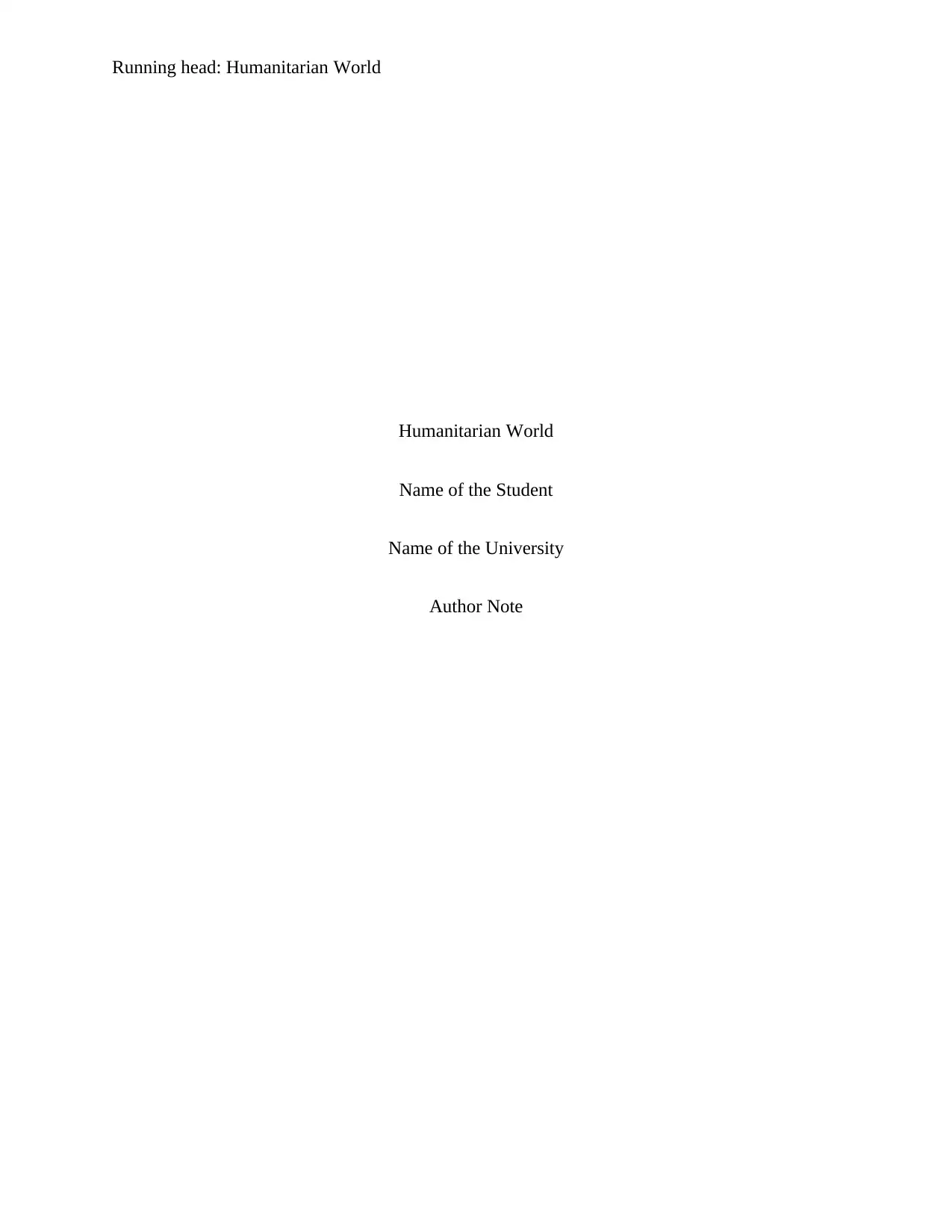
Running head: Humanitarian World
Humanitarian World
Name of the Student
Name of the University
Author Note
Humanitarian World
Name of the Student
Name of the University
Author Note
Secure Best Marks with AI Grader
Need help grading? Try our AI Grader for instant feedback on your assignments.
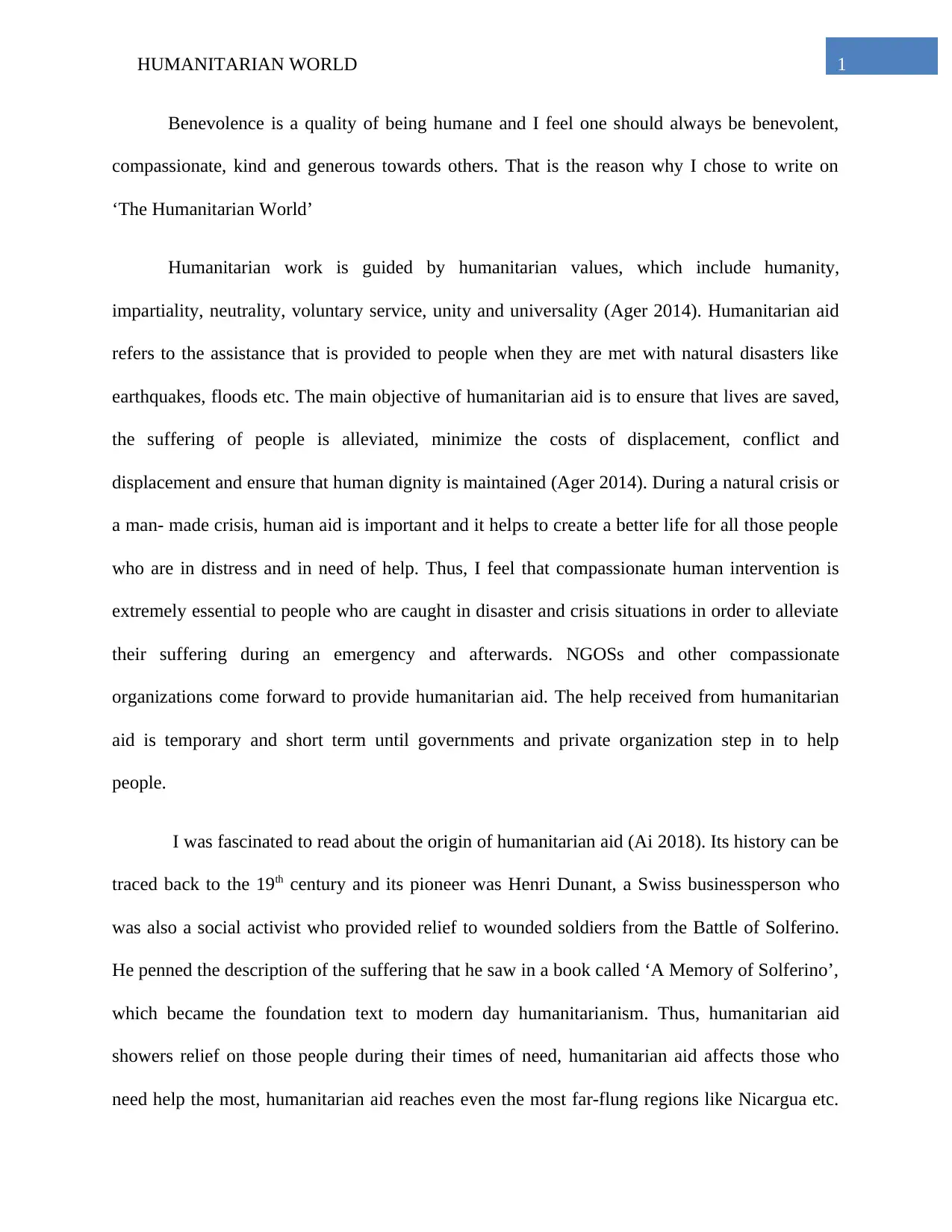
1HUMANITARIAN WORLD
Benevolence is a quality of being humane and I feel one should always be benevolent,
compassionate, kind and generous towards others. That is the reason why I chose to write on
‘The Humanitarian World’
Humanitarian work is guided by humanitarian values, which include humanity,
impartiality, neutrality, voluntary service, unity and universality (Ager 2014). Humanitarian aid
refers to the assistance that is provided to people when they are met with natural disasters like
earthquakes, floods etc. The main objective of humanitarian aid is to ensure that lives are saved,
the suffering of people is alleviated, minimize the costs of displacement, conflict and
displacement and ensure that human dignity is maintained (Ager 2014). During a natural crisis or
a man- made crisis, human aid is important and it helps to create a better life for all those people
who are in distress and in need of help. Thus, I feel that compassionate human intervention is
extremely essential to people who are caught in disaster and crisis situations in order to alleviate
their suffering during an emergency and afterwards. NGOSs and other compassionate
organizations come forward to provide humanitarian aid. The help received from humanitarian
aid is temporary and short term until governments and private organization step in to help
people.
I was fascinated to read about the origin of humanitarian aid (Ai 2018). Its history can be
traced back to the 19th century and its pioneer was Henri Dunant, a Swiss businessperson who
was also a social activist who provided relief to wounded soldiers from the Battle of Solferino.
He penned the description of the suffering that he saw in a book called ‘A Memory of Solferino’,
which became the foundation text to modern day humanitarianism. Thus, humanitarian aid
showers relief on those people during their times of need, humanitarian aid affects those who
need help the most, humanitarian aid reaches even the most far-flung regions like Nicargua etc.
Benevolence is a quality of being humane and I feel one should always be benevolent,
compassionate, kind and generous towards others. That is the reason why I chose to write on
‘The Humanitarian World’
Humanitarian work is guided by humanitarian values, which include humanity,
impartiality, neutrality, voluntary service, unity and universality (Ager 2014). Humanitarian aid
refers to the assistance that is provided to people when they are met with natural disasters like
earthquakes, floods etc. The main objective of humanitarian aid is to ensure that lives are saved,
the suffering of people is alleviated, minimize the costs of displacement, conflict and
displacement and ensure that human dignity is maintained (Ager 2014). During a natural crisis or
a man- made crisis, human aid is important and it helps to create a better life for all those people
who are in distress and in need of help. Thus, I feel that compassionate human intervention is
extremely essential to people who are caught in disaster and crisis situations in order to alleviate
their suffering during an emergency and afterwards. NGOSs and other compassionate
organizations come forward to provide humanitarian aid. The help received from humanitarian
aid is temporary and short term until governments and private organization step in to help
people.
I was fascinated to read about the origin of humanitarian aid (Ai 2018). Its history can be
traced back to the 19th century and its pioneer was Henri Dunant, a Swiss businessperson who
was also a social activist who provided relief to wounded soldiers from the Battle of Solferino.
He penned the description of the suffering that he saw in a book called ‘A Memory of Solferino’,
which became the foundation text to modern day humanitarianism. Thus, humanitarian aid
showers relief on those people during their times of need, humanitarian aid affects those who
need help the most, humanitarian aid reaches even the most far-flung regions like Nicargua etc.
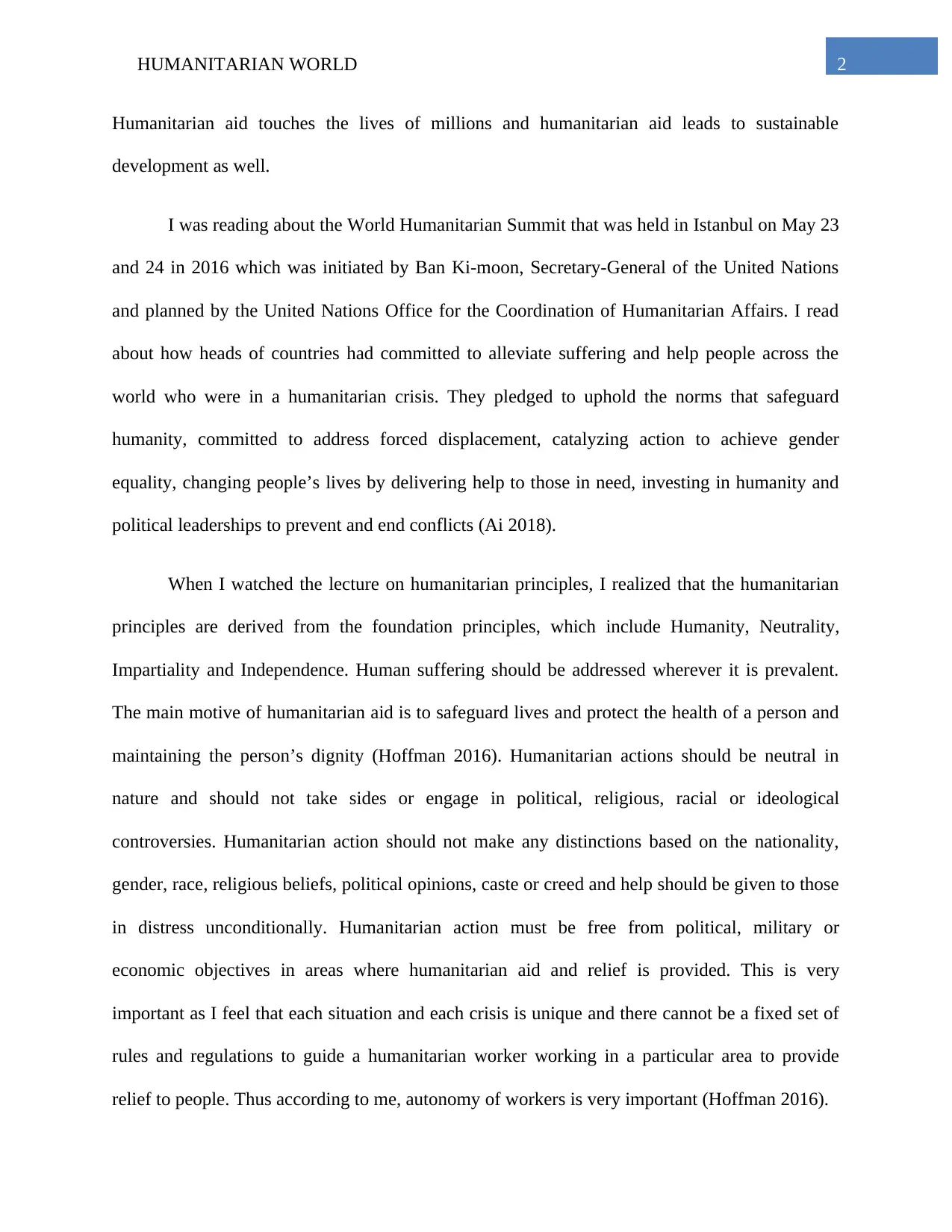
2HUMANITARIAN WORLD
Humanitarian aid touches the lives of millions and humanitarian aid leads to sustainable
development as well.
I was reading about the World Humanitarian Summit that was held in Istanbul on May 23
and 24 in 2016 which was initiated by Ban Ki-moon, Secretary-General of the United Nations
and planned by the United Nations Office for the Coordination of Humanitarian Affairs. I read
about how heads of countries had committed to alleviate suffering and help people across the
world who were in a humanitarian crisis. They pledged to uphold the norms that safeguard
humanity, committed to address forced displacement, catalyzing action to achieve gender
equality, changing people’s lives by delivering help to those in need, investing in humanity and
political leaderships to prevent and end conflicts (Ai 2018).
When I watched the lecture on humanitarian principles, I realized that the humanitarian
principles are derived from the foundation principles, which include Humanity, Neutrality,
Impartiality and Independence. Human suffering should be addressed wherever it is prevalent.
The main motive of humanitarian aid is to safeguard lives and protect the health of a person and
maintaining the person’s dignity (Hoffman 2016). Humanitarian actions should be neutral in
nature and should not take sides or engage in political, religious, racial or ideological
controversies. Humanitarian action should not make any distinctions based on the nationality,
gender, race, religious beliefs, political opinions, caste or creed and help should be given to those
in distress unconditionally. Humanitarian action must be free from political, military or
economic objectives in areas where humanitarian aid and relief is provided. This is very
important as I feel that each situation and each crisis is unique and there cannot be a fixed set of
rules and regulations to guide a humanitarian worker working in a particular area to provide
relief to people. Thus according to me, autonomy of workers is very important (Hoffman 2016).
Humanitarian aid touches the lives of millions and humanitarian aid leads to sustainable
development as well.
I was reading about the World Humanitarian Summit that was held in Istanbul on May 23
and 24 in 2016 which was initiated by Ban Ki-moon, Secretary-General of the United Nations
and planned by the United Nations Office for the Coordination of Humanitarian Affairs. I read
about how heads of countries had committed to alleviate suffering and help people across the
world who were in a humanitarian crisis. They pledged to uphold the norms that safeguard
humanity, committed to address forced displacement, catalyzing action to achieve gender
equality, changing people’s lives by delivering help to those in need, investing in humanity and
political leaderships to prevent and end conflicts (Ai 2018).
When I watched the lecture on humanitarian principles, I realized that the humanitarian
principles are derived from the foundation principles, which include Humanity, Neutrality,
Impartiality and Independence. Human suffering should be addressed wherever it is prevalent.
The main motive of humanitarian aid is to safeguard lives and protect the health of a person and
maintaining the person’s dignity (Hoffman 2016). Humanitarian actions should be neutral in
nature and should not take sides or engage in political, religious, racial or ideological
controversies. Humanitarian action should not make any distinctions based on the nationality,
gender, race, religious beliefs, political opinions, caste or creed and help should be given to those
in distress unconditionally. Humanitarian action must be free from political, military or
economic objectives in areas where humanitarian aid and relief is provided. This is very
important as I feel that each situation and each crisis is unique and there cannot be a fixed set of
rules and regulations to guide a humanitarian worker working in a particular area to provide
relief to people. Thus according to me, autonomy of workers is very important (Hoffman 2016).
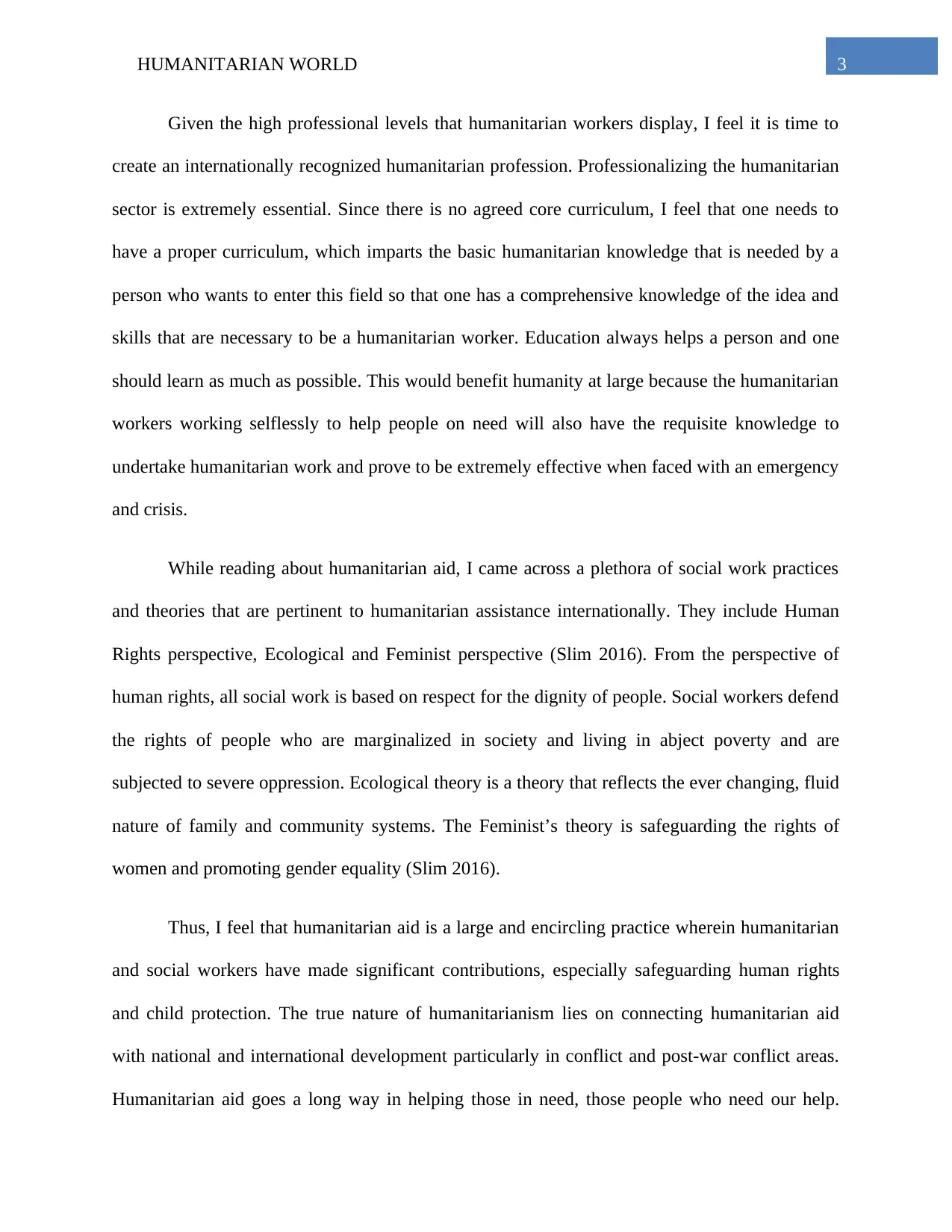
3HUMANITARIAN WORLD
Given the high professional levels that humanitarian workers display, I feel it is time to
create an internationally recognized humanitarian profession. Professionalizing the humanitarian
sector is extremely essential. Since there is no agreed core curriculum, I feel that one needs to
have a proper curriculum, which imparts the basic humanitarian knowledge that is needed by a
person who wants to enter this field so that one has a comprehensive knowledge of the idea and
skills that are necessary to be a humanitarian worker. Education always helps a person and one
should learn as much as possible. This would benefit humanity at large because the humanitarian
workers working selflessly to help people on need will also have the requisite knowledge to
undertake humanitarian work and prove to be extremely effective when faced with an emergency
and crisis.
While reading about humanitarian aid, I came across a plethora of social work practices
and theories that are pertinent to humanitarian assistance internationally. They include Human
Rights perspective, Ecological and Feminist perspective (Slim 2016). From the perspective of
human rights, all social work is based on respect for the dignity of people. Social workers defend
the rights of people who are marginalized in society and living in abject poverty and are
subjected to severe oppression. Ecological theory is a theory that reflects the ever changing, fluid
nature of family and community systems. The Feminist’s theory is safeguarding the rights of
women and promoting gender equality (Slim 2016).
Thus, I feel that humanitarian aid is a large and encircling practice wherein humanitarian
and social workers have made significant contributions, especially safeguarding human rights
and child protection. The true nature of humanitarianism lies on connecting humanitarian aid
with national and international development particularly in conflict and post-war conflict areas.
Humanitarian aid goes a long way in helping those in need, those people who need our help.
Given the high professional levels that humanitarian workers display, I feel it is time to
create an internationally recognized humanitarian profession. Professionalizing the humanitarian
sector is extremely essential. Since there is no agreed core curriculum, I feel that one needs to
have a proper curriculum, which imparts the basic humanitarian knowledge that is needed by a
person who wants to enter this field so that one has a comprehensive knowledge of the idea and
skills that are necessary to be a humanitarian worker. Education always helps a person and one
should learn as much as possible. This would benefit humanity at large because the humanitarian
workers working selflessly to help people on need will also have the requisite knowledge to
undertake humanitarian work and prove to be extremely effective when faced with an emergency
and crisis.
While reading about humanitarian aid, I came across a plethora of social work practices
and theories that are pertinent to humanitarian assistance internationally. They include Human
Rights perspective, Ecological and Feminist perspective (Slim 2016). From the perspective of
human rights, all social work is based on respect for the dignity of people. Social workers defend
the rights of people who are marginalized in society and living in abject poverty and are
subjected to severe oppression. Ecological theory is a theory that reflects the ever changing, fluid
nature of family and community systems. The Feminist’s theory is safeguarding the rights of
women and promoting gender equality (Slim 2016).
Thus, I feel that humanitarian aid is a large and encircling practice wherein humanitarian
and social workers have made significant contributions, especially safeguarding human rights
and child protection. The true nature of humanitarianism lies on connecting humanitarian aid
with national and international development particularly in conflict and post-war conflict areas.
Humanitarian aid goes a long way in helping those in need, those people who need our help.
Secure Best Marks with AI Grader
Need help grading? Try our AI Grader for instant feedback on your assignments.

4HUMANITARIAN WORLD
Thus, one should be kind, compassionate and helpful and try to help as much as possible to those
in need.
Thus, one should be kind, compassionate and helpful and try to help as much as possible to those
in need.

5HUMANITARIAN WORLD
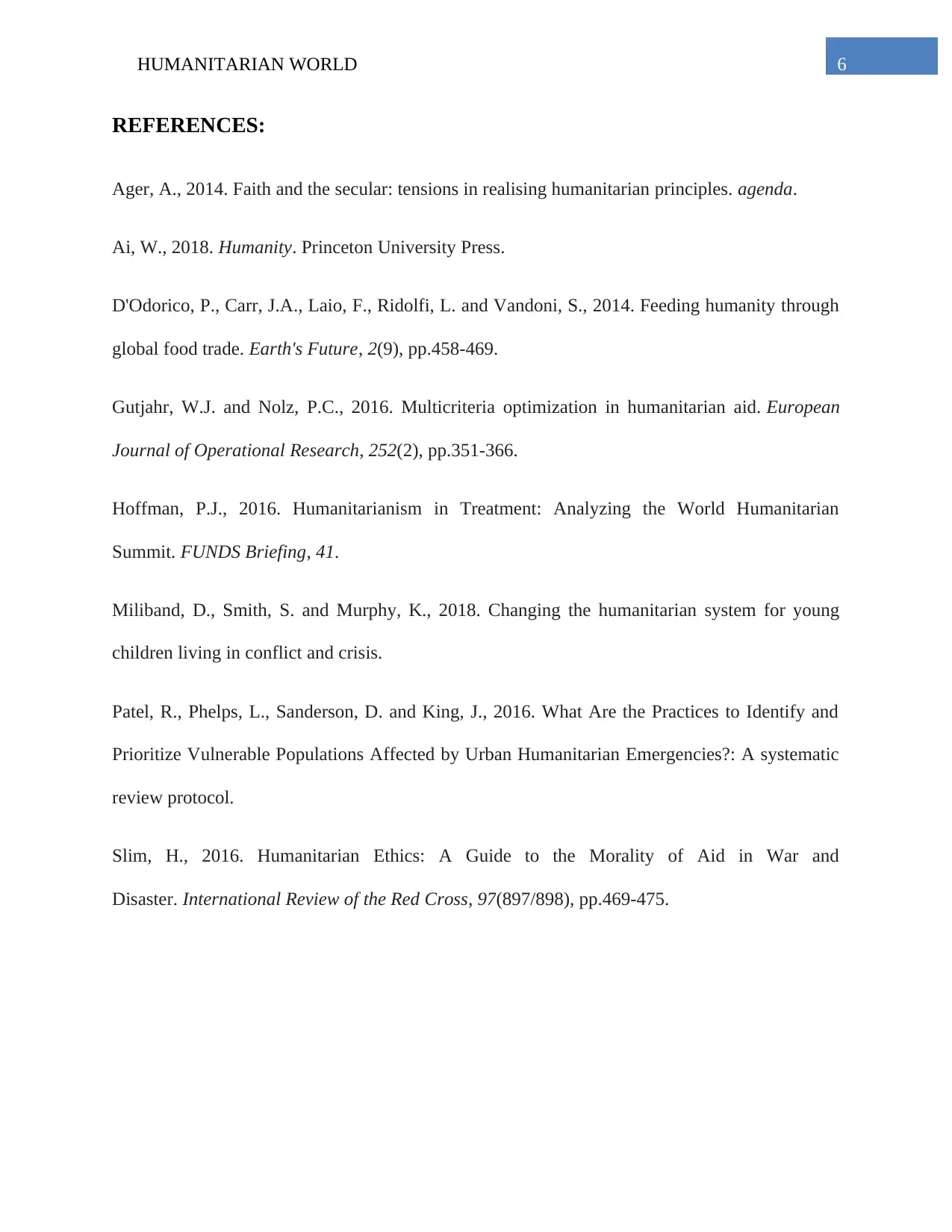
6HUMANITARIAN WORLD
REFERENCES:
Ager, A., 2014. Faith and the secular: tensions in realising humanitarian principles. agenda.
Ai, W., 2018. Humanity. Princeton University Press.
D'Odorico, P., Carr, J.A., Laio, F., Ridolfi, L. and Vandoni, S., 2014. Feeding humanity through
global food trade. Earth's Future, 2(9), pp.458-469.
Gutjahr, W.J. and Nolz, P.C., 2016. Multicriteria optimization in humanitarian aid. European
Journal of Operational Research, 252(2), pp.351-366.
Hoffman, P.J., 2016. Humanitarianism in Treatment: Analyzing the World Humanitarian
Summit. FUNDS Briefing, 41.
Miliband, D., Smith, S. and Murphy, K., 2018. Changing the humanitarian system for young
children living in conflict and crisis.
Patel, R., Phelps, L., Sanderson, D. and King, J., 2016. What Are the Practices to Identify and
Prioritize Vulnerable Populations Affected by Urban Humanitarian Emergencies?: A systematic
review protocol.
Slim, H., 2016. Humanitarian Ethics: A Guide to the Morality of Aid in War and
Disaster. International Review of the Red Cross, 97(897/898), pp.469-475.
REFERENCES:
Ager, A., 2014. Faith and the secular: tensions in realising humanitarian principles. agenda.
Ai, W., 2018. Humanity. Princeton University Press.
D'Odorico, P., Carr, J.A., Laio, F., Ridolfi, L. and Vandoni, S., 2014. Feeding humanity through
global food trade. Earth's Future, 2(9), pp.458-469.
Gutjahr, W.J. and Nolz, P.C., 2016. Multicriteria optimization in humanitarian aid. European
Journal of Operational Research, 252(2), pp.351-366.
Hoffman, P.J., 2016. Humanitarianism in Treatment: Analyzing the World Humanitarian
Summit. FUNDS Briefing, 41.
Miliband, D., Smith, S. and Murphy, K., 2018. Changing the humanitarian system for young
children living in conflict and crisis.
Patel, R., Phelps, L., Sanderson, D. and King, J., 2016. What Are the Practices to Identify and
Prioritize Vulnerable Populations Affected by Urban Humanitarian Emergencies?: A systematic
review protocol.
Slim, H., 2016. Humanitarian Ethics: A Guide to the Morality of Aid in War and
Disaster. International Review of the Red Cross, 97(897/898), pp.469-475.
1 out of 7
Related Documents
Your All-in-One AI-Powered Toolkit for Academic Success.
+13062052269
info@desklib.com
Available 24*7 on WhatsApp / Email
![[object Object]](/_next/static/media/star-bottom.7253800d.svg)
Unlock your academic potential
© 2024 | Zucol Services PVT LTD | All rights reserved.





